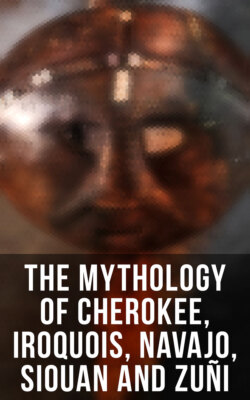Читать книгу The Mythology of Cherokee, Iroquois, Navajo, Siouan and Zuñi - James Mooney - Страница 69
На сайте Литреса книга снята с продажи.
The Prey-Gods
ОглавлениеThis tradition furnishes additional evidence relative to the preceding statement, and is supposed to enlighten the Zuñi Indian as to wherein lies the power of fetishes. It is thought that the hearts of the great animals of prey are infused with a 'medicinal' or magic influence over the hearts of the animals they prey upon, and that they overcome them with their breath, piercing their hearts and quite numbing them. Moreover, their roar is fatal to the senses of the lower beasts. The mountain lion absorbs the blood of the game animals, therefore he possesses their acute senses. Again, those powers, as derived from his heart, are preserved in his fetish, since his heart still lives, even although his body be changed to stone. It happens, therefore, that the use of these fetishes is chiefly connected with the chase. But there are exceptions. The great animals of the chase, although fetishistic, are also regarded as supernatural beings, the mythological position of which is absolutely defined. In the City of the Mists lives Po-shai-an-K'ia, father of the 'medicine' societies, a culture-hero deity, whose abode is guarded by six beings known as the 'Prey-Gods,' and it is their counterfeit presentments that are made use of as fetishes. To the north of the City of the Mists dwells the Mountain Lion prey-god, to the west the Bear, to the south the Badger, to the east the Wolf, above the Eagle, below the Mole. These animals possess not only the guardianship of the six regions, but also the mastership of the 'medicine' or magic powers which emanate from them. They are the mediators between Po-shai-an-K'ia and man. The prey-gods, as 'Makers of the Path of Life,' are given high rank among the gods, but notwithstanding this their fetishes are "held as in captivity" by the priests of the various 'medicine' orders, and greatly venerated by them as mediators between themselves and the animals they represent. In this character they are exhorted with elaborate prayers, rituals, and ceremonials, and sometimes placated with sacrifices of the prey-gods of the hunt (we-ma-a-ha-i). Their special priests are the members of the Great Coyote People—that is, they consist of eleven members of the Eagle and Coyote clans and of the Prey Brothers priesthood. These prey-gods appear to be almost unique, and may be indicated as an instance of fetishism becoming allied with religious belief. They depict, with two exceptions, the same species of prey animals as those supposed to guard the six regions, the exceptions being the coyote and the wild cat. These six prey animals are subdivided into six varieties. They are, strictly speaking, the property of the priests, and members and priests of the sacred societies are required to deposit their fetishes, when not in use, with the Keeper of the Medicine of the Deer. These 'medicines' or memberships alone can perfect the shape of the fetishes and worship them.
